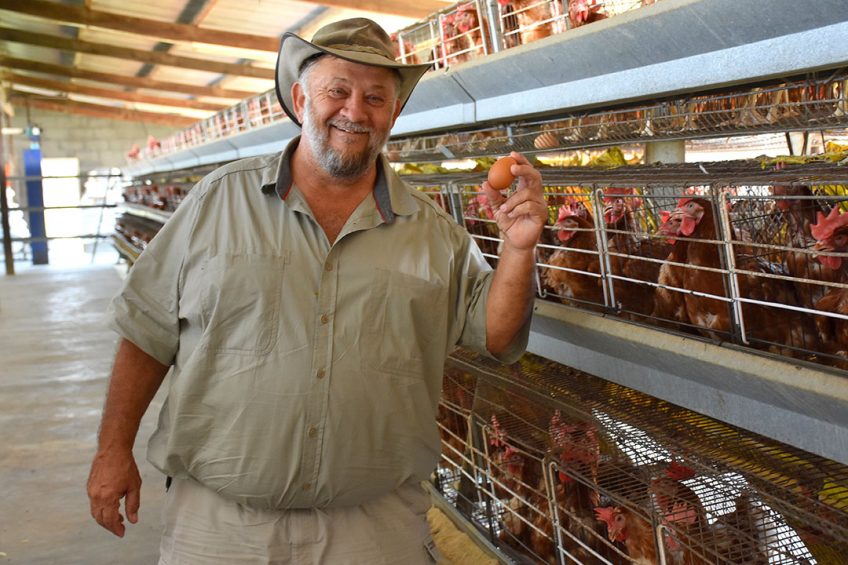Cashing in on strong egg demand in Botswana

Running a large pedigree Brahman beef herd in Botswana takes up a lot of time especially when Wayside Brahman Stud is also home to a game farm, commercial beef feedlots, holiday chalets and an 18 hole golf course. However, the Munger family who own the farm also saw a niche market for eggs and set up their own layer houses a number of years ago with huge success.
As a relatively cheap source of protein in Botswana, eggs have become very popular and in big demand from consumers particularly so in Francistown, where Rowland Munger and his son Rowly farm with Rowland’s dad Keith, who started the farm. The egg laying enterprise is situated on the far end of the farmyard extending to 7 houses with a total capacity of 30,000 birds. Currently the farm is running 14,000 birds producing around 10,000 eggs per day for sale. Eggs are delivered up to 200kms away by the farm’s own delivery vehicles to a range of retailers in the towns and to food production outlets. “We have 17 staff dedicated to the laying hens enterprise,” said Rowly. “Two staff are allocated to each house and the rest work in the egg processing room. The staff at the hen houses work in shifts having every second weekend off.
Fewer birds per cage
“The hens are kept in cages but we keep fewer birds per cage than our full capacity to give them more room and increase the animals welfare and subsequently their longevity. “Our houses are relatively simple as the first ones were built around 1990 but as time has passed we have built more modern houses with automatic feeding systems from Big Dutchman. They are still generally all quite labour intensive but there is a good supply of labour here in this area,” he said.
Eggs are collected twice per day from all the houses and taken to the processing unit to be graded into size and cleaned. Eggs are graded into XL, L, M and S sizes with any double yolks going to the Munger households. “We sell around 10,000 eggs per day to the retailers,” said Rowly. “Eggs sell for Pula 1.66 (£0.12; US$ 0.16) each for a large egg. By far the most common packaging size is 4 dozen eggs which people demand more of as the packs are handy to carry coming in a carton with a handle on it.
“The first egg collection is finished by mid morning and the second one starts at 2pm. Each collection takes about an hour to complete. Eggs are then graded by the automatic machine but it has to be loaded by hand. “We only produce brown eggs for sale and use the Lohmann Brown and Hi-Line Brown breeds. There was a problem with sourcing birds at one stage and we had to bring in a white hen which was guaranteed to lay a brown egg.
“In order to increase the welfare of the bird we only keep 3 of the birds in each cage and we normally keep a chicken for about one year. Our average laying percentage is around 80% and we try to keep it at that level if we can,” he said. All of the hens are usually sourced at point of lay stage from breeders in South Africa. They are fed layers mash which is also imported from South Africa as well. Birds are all vaccinated against Newcastle Disease and there has never been any issue with bird flu there. “As we cannot grow any significant areas of cereals in this Botswana bush we are forced to import all the feed for the hens from South Africa,” added Rowly. “This inevitably increases our cost of production but there is nothing we can do about that.”
Resurrect the old business
“The laying unit was first started back in 1990,” said Rowly. “We ran it for six years and then sold the business to a poultry specialist company that took it over. “However, they stopped about ten years later and the houses lay empty until we decided to resurrect the business again in 2013. “More of the houses need upgrading and we will modernise them gradually. Right now the system is working well and there are not so many issues with the egg business,” he said. “Of course the prices could improve and that would be a good help.”
Temperatures can hit 40°C in this region of Botswana therefore the hens must be kept well ventilated. The Mungers also discovered a novel way of keeping the birds cooler. “The sides of the poultry houses open up so we can regulate the temperatures inside,” said Rowly. “It can get pretty hot here so we must monitor the temperature throughout the day. “We also found that by painting the tin roof of each house with white paint naturally dropped the temperature inside the house down by a few degrees. “It was another cheap way of controlling the environment for the birds inside their houses. Obviously at night we close up the houses as it does get a bit cooler when the sun goes down.”

The manure from the hen houses also doesn’t go to waste as it is sold to market gardeners and used on their own fields. “There is big demand for the manure as a rich fertiliser,” added Rowly. “It certainly works well in combination with our soils to grow vegetables.” Botswana strives to be a nation that produces the majority of the food it needs itself and is currently 95% self-sufficient in poultry meat and eggs. There are not so many egg producers in the Francistown region hence why the Munge family experience big demand for their eggs and have such a wide delivery area to work in.















